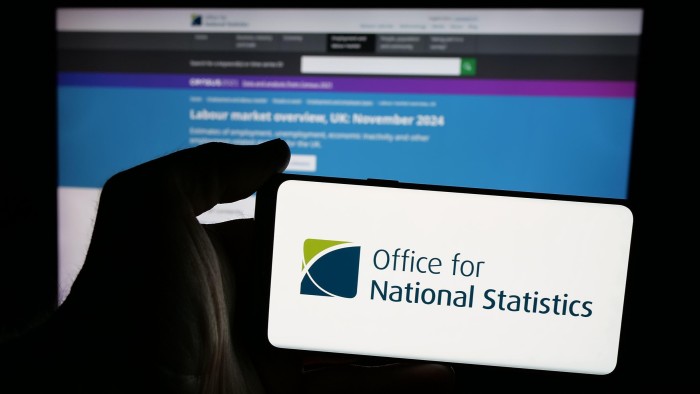Unlock the Editor’s Digest for free
Roula Khalaf, Editor of the FT, selects her favourite stories in this weekly newsletter.
The UK government has been told to split the role of the country’s top statistician in a hard-hitting report that criticised the Office for National Statistics’ handling of the country’s most market sensitive economic data.
A review by Sir Robert Devereux commissioned by the government warned of “deep-seated” issues within the ONS as it recommended that the role of the national statistician be temporarily split in two during a turnaround effort at the embattled agency.
One official should take responsibility for statistical output, and a separate ONS permanent secretary would be tasked with running the department, according to the report.
The report left open the possibility of recombining the roles “once the organisation’s core business is back on a more stable footing”. The Cabinet Office said it would respond quickly to the report and act upon the issues described in it.
The recommendations come as the ONS admitted its numbers “have not met users’ expectations on quality and trustworthiness” and set out a far-reaching plan to upgrade its systems and data-collection practices.
“We have sometimes tried to be all things to all people, spreading our resources too thin, limiting our investment in our core statistics,” the ONS said. “The ONS regrets these quality issues and understands the significant challenges they have presented for our users.”
The ONS has been hit by a widening series of data quality problems affecting some of its most important economic figures, among them jobs statistics, producer prices, trade figures and most recently consumer prices inflation.
The decision to split the role of the UK’s top statistician — occupied until recently by Sir Ian Diamond — comes after years of warnings by economists that the job is too unwieldy.
Denise Lievesley, a former president of the Royal Statistical Society, told the FT last month that the job was too wide-ranging and required too many different skills to be easily found in one person.
As national statistician, Diamond was responsible not only for the daily running of the ONS but also for leading the government’s statistical service, representing the UK internationally and advising ministers.
The Devereux review found a host of problems with the way the office operates, including poor co-ordination between team members, staff retention issues, and only piecemeal efforts to tackle emerging problems in statistical series.
The ONS said it will now beef up efforts to spot problems in data, develop a new business register with wider sampling, boost its household survey by knocking on more doors, and spend an extra £10mn to pay for 150 new roles focused on core economic and population statistics.
To fund this, it is closing its Integrated Data Programme — where it has led a cross-government effort to join up data sources, with mixed results — scaling back its work on social and public policy topics; and cutting management and back office roles.
In addition, the ONS promised to engineer “a shift in the culture of our organisation, to embrace critical views, encourage greater curiosity, heed early warning signals and be open about the challenges we face”.




